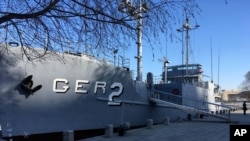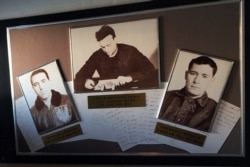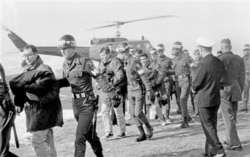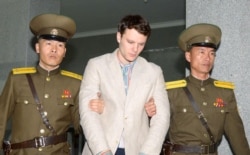More than 50 years ago, North Korea captured the USS Pueblo and subjected the spy ship’s crew to “barbarity” for almost a year, treatment that “required medical and/or psychiatric intervention” for the men upon their release in December 1968.
Today, crew members and their families face the challenge of finding North Korea’s assets so they can realize their shares of a $2.3 billion judgment against Pyongyang handed down by a U.S. district court.
In a memorandum opinion issued Feb. 16 but filed and made public Wednesday, the U.S. District Court for the District of Columbia stated that “North Korea was liable” for “its incorporated theories of assault, battery, false imprisonment, intentional infliction of emotional distress, solatium, and wrongful death.”
Memorandum opinion on USS Pueblo:
The court awarded compensatory and punitive damages to 171 plaintiffs, including living crew members, the estates of deceased crew members, and living family members and the estates of deceased family members.
The court granted a baseline award of $3.35 million for each crew member, which would amount to $10,000 for each of the 335 days that the crew members were held in captivity by the North Koreans. Further awards are based on calculations that allow for variations within the groups.
But the decision included the finding that, “As a result of the barbarity inflicted by the North Koreans, almost all [crew members] required medical and/or psychiatric intervention. The majority have suffered, and continue to suffer, from post-traumatic stress disorder, impaired memory, intrusive flashbacks, nightmares, hypervigilance, anxiety, anger, depression, guilt, and withdrawal from others. Many have undergone invasive surgical procedures to ameliorate the physical damage resulting from the relentless torture they underwent as prisoners. Several have attempted to numb their pain through alcohol and drugs, and most have seen their domestic and/or professional lives deteriorate. A few have contemplated suicide.”
“Justice is served insofar as the courts are concerned,” Mark Bravin, the lead attorney representing the plaintiffs of the USS Pueblo case, told VOA’s Korean Service.
VOA contacted the North Korean mission in New York for a response but left a voicemail message after being unable to talk with anyone.
More than 100 crew members and their families filed a lawsuit against North Korea in February 2018 under the Foreign Sovereign Immunities Act. It allows victims to sue a foreign government listed as a state sponsor of terrorism for torture, hostage-taking, personal injury or death.
In November 2017, former President Donald Trump redesignated North Korea under the state sponsors of terrorism list after it was removed from the list by former President George W. Bush in 2008. The reinstatement cleared the way for Pueblo survivors and their families to pursue a lawsuit against North Korea.
The total damages the court awarded in the Pueblo case are the largest amount awarded in a state-sponsored terrorism case.
The plaintiffs are unlikely, however, to recover funds directly from North Korea, which has a history of ignoring such lawsuits.
However, each plaintiff, if found eligible, may receive up to $20 million available through the U.S. Victims of State Sponsored Terrorism Fund, which was set up to compensate the victims of state-sponsored terrorism.
Bravin said the distribution from the fund is subject to some conditions to prevent individual claimants from “monopolizing” the fund.
“They don’t get more money after their $20 million is received until everybody else has gotten their money,” Bravin said. “Once somebody gets 30% of their money, [the distributions] are paused so that others can [get theirs].”
Joshua Stanton, an attorney based in Washington, D.C., who helped draft the North Korea Sanctions and Policy Enhancement Act of 2016, said the plaintiffs have the option of seeking “the rest of their money from the North Koreans.”
“The way they will typically try to go after that is [through] frozen properties of the government of North Korea,” he said.
An example of a frozen asset could be U.S. dollars that a North Korean bank tried to wire through a bank in New York City to a Chinese bank, Stanton said.
“The North Koreans usually do use the dollar system to move their money around,” he added.
“They would wire it to a bank account somewhere. But the funds would go through a bank within U.S. jurisdiction. The bank does some checks on the names, addresses, passport numbers of the parties. They would get their software to go on an alert. They would freeze the funds and notify the Treasury Department,” he said.
In the case of the parents of Otto Warmbier against North Korea, Frederick and Cynthia Warmbier filed a claim against the North Korean-flagged vessel Wise Honest in July 2019 to obtain a North Korean government asset to pay part of the $500 million judgment awarded to them.
Otto Warmbier, a University of Virginia student, visited North Korea in 2015 and died shortly after returning to the U.S. in a vegetative state in June 2017.
The federal court in the District of Columbia in December 2018 ordered the judgment against North Korea after the Warmbiers filed a lawsuit in April 2018, holding the country liable for the torture, hostage-taking and extrajudicial killing of their son.
The U.S. Marshals Service auctioned the Wise Honest in 2019 and, as is customary, did not release how much was realized.
The Pueblo was seized by the North Korean navy in January 1968 while the U.S. ship was operating in international waters off the coast of North Korea. The Pueblo was engaged in an intelligence-gathering mission to intercept communications between Pyongyang and Moscow.
After 11 months of suffering repeated beatings and torture, surviving crew members were released at the Demilitarized Zone dividing North and South Korea. The spy ship is moored along a river in Pyongang as part of North Korea's Victorious War Museum.
Aside from the damages awarded to the crew and their family members, Bravin said the return of the Pueblo would give them peace of mind.
“One additional thing that could happen that would give peace of mind to the crew is if the United States and North Korea could find a way to get the Pueblo returned to the United States,” Bravin said. “It’s been an issue of concern for the crew forever.”
Christy Lee contributed to this report, which originated on VOA Korea.












